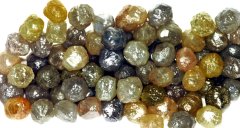| The Very Highest Quality Diamond Information... |
| Harder than Diamond |
|
|

|
|
|
What's Harder?
Fullerites, or Polymerized Single Walled NanoTubules (P-SWNT)
Beta Carbon Nitride (β-C3N4)
This is currently classed by some as a theoretical material, although in 2000, Northwestern University, Illinois claimed to have synthesized minute particles of it.
Beta carbon nitride (β-C3N4) is a theoretical material, derived from theories on crystalline structure.Ultrahard Fullerite C60
The material was first proposed in 1985 by Marvin Cohen and Amy Liu. Examining the nature of crystalline bonds they theorised that carbon and nitrogen atoms could form a particularly short and strong bond in a stable lattice in a ratio of 1:1.3. That this material would be harder than diamond on the Mohs scale was first proposed in 1989.
The theoretical material has so far proved impossible to make: by nature carbon and nitrogen will not form a crystalline structure. In 2000 a team at Northwestern University, Illinois claimed to have created atom-thick layers of the material by magnetron sputtering: creating at least partially spł-bonded crystalline carbon nitrides at the junction of successive layers of titanium nitride and carbon nitride.
Ultrahard fullerite (C60) is a unique version of fullerene with three-dimensional polymer bonds. This should not be confused with P-SWNT fullerite, even though that material is also a polymerized version of fullerene. It has been shown that ultrahard fullerite when testing diamond hardness with a scanning force microscope can scratch diamond. In turn, using more accurate measurements, these values are now known for diamond hardness. A Type IIa diamond (111) has a hardness value of 167±6 gigapascals (GPa) when scratched with an ultrahard fullerite tip. A Type IIa diamond (111) has a hardness value of 231±5 GPa when scratched with a diamond tip; this leads to hypothetically inflated values.
Ultrahard fullerite has a hardness value of 310 GPa, though the actual value may range ±40 GPa, since testing done using an ultrahard fullerite tip on ultrahard fullerite will lead to, like diamond on diamond, distorted values. It is thought that beta carbon nitride will have a hardness value, if harder than diamond, less than that of ultrahard fullerite.
Diamond
Diamonds are made harder than...diamond
What is harder than diamond? One example, perhaps surprisingly, is diamond, provided it has been appropriately "cooked". Chih-shiue Yan of the Carnegie Institute of Washington and colleagues have grown gem-sized single crystals of diamond in a special microwave plasma chemical-vapour deposition technique that produces crystals at very high growth rates, up to 100 times faster than is usual. These diamonds are already very hard, but by applying high-pressure (5-7 GPa) and high-temperature (2000 °C) annealing the hardness increases still further.
The mechanism is not yet understood, but appears to be some kind of work hardening. How much harder are these diamonds than ordinary ones? The answer is not yet known, but they are at least 50% harder than synthetic diamonds produced more conventionally. Some were certainly harder than the tools used to gauge the hardness of lesser stones as they broke the measuring equipment.
Source: Cern Courier
Adamantium (fictional)
Scrith (fictional)
Hard to Get Reliable Information
We notice there are still hundreds of jewellery websites out there still saying that diamond is the hardest substance. They are all wrong, and out of date by many years, which does not surprise us at all. We suggest you learn to avoid jewellers and other salespeople who don't know what they are talking about.
Diamond 4C's Tour - Next Stop - Colour
| ...at the Lowest Possible Price |
|
32 - 36 Harrowside, Blackpool, Lancashire, FY4 1RJ, England. Telephone (44) - (0) 1253 - 343081 ; Fax 408058; E-mail: The URL for our main page is: https://24carat.co.uk | Chard(1964) Ltd |